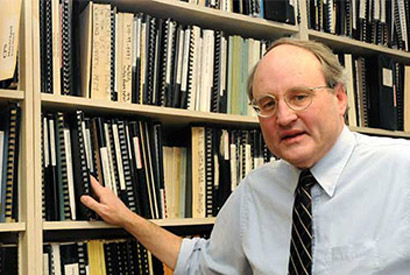Disrespect in politics: Is civility possible?
Goldman School Dean Henry Brady discusses the trajectory of -- and need for -- civility in politics.

July 13, 2012
Has disrespect become mainstream in American politics? Henry Brady, dean of UC Berkeley’s Goldman School of Public Policy and Class of 1941 Monroe Deutsch Professor of Political Science and Public Policy, and others will take on the topic in a a forum, “Is Civility Overrated?” next Monday (July 16) in San Francisco. It is being sponsored by the Searching for Democracy Initiative of the non-profit Cal Humanities organization, in conjunction with the Zócalo Public Square.
An authority on electoral politics and political engagement, Brady has observed and studied political contests, trends and movements. He is co-author of the just-released book, “The Unheavenly Chorus: Unequal Political Voice and the Broken Promise of American Democracy.” Brady recently shared with UC Berkeley’s Office of Public Affairs some of his views on civility in contemporary politics.

Goldman School of Public Policy Dean Henry Brady
Q: How do you define civility in American politics? Is it any different than civility in day-to-day life?
A: Although civility in everyday life and civility in politics have much in common, politics is essentially contentious in a way that day-to-day life is not. Their common features are having good manners, being willing to listen, and showing a concern for other people’s feelings and opinions. But political civility requires more than politeness and respectful listening; it also requires a realization that we must live together and ultimately compromise on some things where we differ in fundamental ways.
Q: How important is civility in American politics?
A: Without civility, we are in a Hobbesian world that is nasty and brutish. We are in a world that cannot solve problems through politics. Civility and a willingness to compromise are essential parts of politics.
Q: Is civility on the wane in American politics?
A: Political polarization between the two major political parties has increased dramatically in the last 40 years, and with this polarization, civility has waned. Name-calling and angry exchanges occur regularly on cable television channels and radio talk show programs. Yet it would be wrong to presume that we are at an historic low in political civility – American politics became polarized (with vicious attacks on politicians in the press) when Thomas Jefferson and James Madison formed the Democratic Republican Party in 1791 to oppose the Federalist Party of John Adams. The country settled into an “Era of Good Feelings” in 1816 with the Presidency of James Monroe, but within a decade, politics heated up with the contest between John Quincy Adams and Andrew Jackson in 1824 and the difficult debates over slavery.
Politics remained highly polarized through the Civil War and afterward, during the last half of the 19th century. It was only after the traumas of the Great Depression and World II that American politics entered another era of bi-partisanship (at least in foreign policy and in the acceptance by both parties of the New Deal reforms) through the early 1960s. Then came Vietnam, the political consequences of the Civil Rights Movement, and growing involvement of religious fundamentalists in politics. Today, the two parties are split over basic questions such as taxes and spending, abortion, gay rights and many other topics.
Q: Who — or what — do you see as most responsible for either the highs and lows in civility in American politics?
A: Incivility is primarily the result of political polarization between the two political parties, and this seems to have its roots in the growing inequality in America. The growth of cable news and the increasing role of Super-PACs and “social welfare groups” that spend prodigiously on political advertisements have added to the problem by fueling political polarization and incivility. At the same time, there is virtually no evidence that the American public is more highly polarized than 40 years ago – it is the political parties that are fighting with one another while a growing group of independents looks on.
Q: What can the public do to promote civility in the political arena?
A: The growth of political independents surely sends a message to political parties, but so far, partly because it is so hard to start successful third party movements in America, this growth has not had much impact on the political parties. Perhaps the most important thing that citizens can do is to reject the demonization of one’s political opponents and to recognize the importance of compromise.
Q: Do you see the current climate for civility changing?
A: With growing inequality, feckless political parties, even more irresponsible independent political groups, and a media goading everyone on, it is hard to see how civility will increase any time soon. We are simply in one of those periods in American politics where polarization and incivility dominate our politics.
For more information about the free Monday night forum, for which reservations are recommended, visit www.zocalopublicsquare.org.